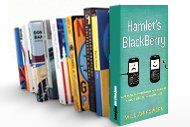
William Powers
267 pages | Buy this book
This how-to-survive-the-digital-age handbook is part self-help guide, part memoir, and part research paper (though fortunately, it doesn't read like one). Unlike the spate of books and articles about how technology is rotting our brains, this informative and innovative treatise walks us through the ways Plato (and six other philosophers) were addicted to the "BlackBerrys" of their days. And if those wise old white guys triumphed, we'll be fine, too.
What's the Big Deal?
Beware the downward spiral into the neverland of what Powers calls "Digital Maximalism," in which being connected (the goal of much of our daily existence these days) means losing the vividness of existence. What's different about Powers is that he doesn't write off digital connectedness as one big, bad wolf. We need it, obviously. But we also need our space away from digital devices so that we can use them as the worldliest of philosophers once used their own technologies: as a tool. As an antidote to dealing with today's technological frenemies (BlackBerrys, etc.), Powers examines seven tools that threatened to lead to information overload, including writing, the printing press, writing tables, telegraphs, and railroads.
Buzz Rating: Whisper
Powers sparked conversation when he first broached the topic, but aside from a positive review in the Spanish-language newspaper El Tiempo and a review in The Wall Street Journal, it doesn't look like the idea of Shakespeare and handhelds is reaching today's audience.
One-Breath Author Bio
Powers used to write about media and technology for The Washington Post; during a fellowship at Harvard University's Shorenstein Center on the Press, Politics, and Public Policy, he had the time to write this book, his first.
The Book In His Words
"What I'm proposing here is a new digital philosophy, a way of thinking that takes into account the human need to connect outward, to answer the call of the crow, as well as the opposite need for time and space apart" (page 4).
Don't Miss These Bits
1. First there was the epiphany. After ending a cell-phone conversation with his mother (while he was driving—tsk, tsk) he experienced a surreal sensation, in his words, a "feeling of time out of time" (page 23). After hanging up and a few minutes of quiet contemplation, he says he was suddenly able to draw up memories and develop an even stronger connection to her, all because of a few seconds on his "clamshell-style phone." After that, he began to semiworship his phone and simultaneously to vow to recognize the depth that technology can add to human experience. Despite his epiphany, Powers has come to the realization that being connected all the time also hurts us.
2. To predict the future, Powers goes backward. He examines the way seven philosophers—from Plato to Marshall McLuhan—employed the technology they had at hand. Though it feels like a stretch to compare Henry David Thoreau's telegrams to today's e-mails, Powers makes an engrossing case for why the paranoia surrounding new technology is overblown, and why it's really our responsibility to find depth and distance from these technologies to preserve our sanity.
3. Product placement? Powers obsesses about his "slender," "fuzzy, and faintly warm" Moleskine notebooks. He says it's about the magic of paper (page 138), but it's uncomfortably overplayed. Let's see if his term "Moleskine-ophilia" catches on.
4. Wait, Hamlet didn't have a BlackBerry! William Shakespeare actually used a writing table, one that needed a sponge and water. Regardless, Powers speculates that if Hamlet were less distracted, the play might have ended differently (page 155). Umm, probably not, actually. It was meant to be a tragedy.
Swipe This Critique
Powers argues that digital maximalism is hurting us and that we should strive for minimalism. He does a great job of educating us without being too obvious about it, and it's also a surprisingly engaging read for something that started off as a research paper at Harvard. And though his overall argument holds up, it's marred by the occasional intellectual stretch. For instance, books were once technological distractions? That's reaching.
Gradebook
Prose: Entertaining and informative.
Construction: He starts with a futuristic allegory, goes back into the past and ends with his own strategies of dealing with the demands new technologies place on our time.
Bottom Line: This book convinced me to write all of this by hand (!) before typing it. Oh, and adios, smart phone.
Uncommon Knowledge
Newsweek is committed to challenging conventional wisdom and finding connections in the search for common ground.
Newsweek is committed to challenging conventional wisdom and finding connections in the search for common ground.





